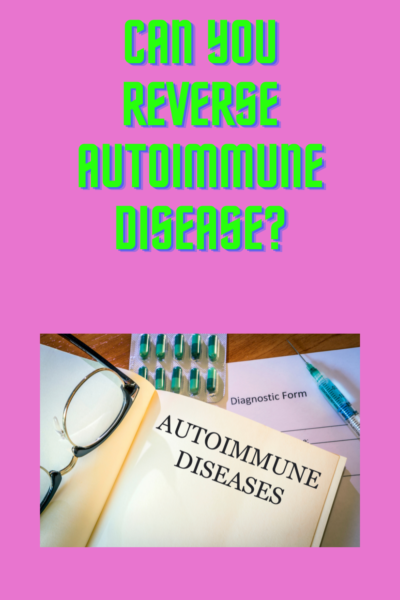Introduction:
As a health coach, one of the most frequently asked questions I get is – “Can you reverse autoimmune disease? ” This is more complicated than just a yes or no. Certain ones are easier to reverse than others and most of the time you can go into remission but you still have the autoimmune diesease. Some autoimmune diseases are best managed by diet whereas others are most complicated than that. Keep reading to learn more about the topic of reversing autoimmune diseases.
Autoimmune diseases are a group of disorders in which the body’s immune system mistakenly attacks healthy cells, tissues, and organs, leading to a wide range of debilitating conditions. With more than 80 recognized autoimmune diseases affecting millions of people worldwide, they present a significant health challenge. In this blog post, we will delve into the current understanding of autoimmune diseases, explore potential approaches for their reversal, and discuss the challenges that lie ahead.
Understanding Autoimmune Diseases:
Before we dive into the possibility of reversing autoimmune diseases, it’s essential to grasp their underlying mechanisms. Normally, the immune system is designed to protect the body from harmful invaders like bacteria and viruses. However, in autoimmune diseases, the immune system mistakenly identifies healthy cells and tissues as foreign threats, launching an attack that results in chronic inflammation and damage to organs and tissues.
Common autoimmune diseases include rheumatoid arthritis, multiple sclerosis, lupus, type 1 diabetes, hashimoto’s, graves disease and inflammatory bowel disease, among others. While their exact causes are not entirely understood, genetics, environmental triggers, and dysregulation of the immune system are believed to play pivotal roles in their development.
Can Autoimmune Diseases be Reversed?
The idea of reversing autoimmune diseases elicits hope and optimism for patients seeking relief from their symptoms and a potential return to normalcy. While the concept of “reversal” is challenging, some research suggests that it may be possible to achieve remission or reduce disease activity through various treatment approaches.
- Immunomodulatory Medications: Several medications, such as corticosteroids, disease-modifying antirheumatic drugs (DMARDs), and biologics, have shown promise in suppressing the immune system and controlling autoimmune responses. These treatments can help manage symptoms and prevent further damage, leading to a better quality of life for patients.
- Lifestyle Modifications: Adopting a healthy lifestyle can significantly impact the course of autoimmune diseases. Regular exercise, a balanced diet, stress management, and adequate sleep can contribute to improved immune function and overall well-being. I’ve also found therapies like massage, chiropractic, acupuncture and infrared sauna to be helpful.
- Personalized Medicine: With advances in medical research, there is a growing focus on personalized medicine. Tailoring treatments based on an individual’s genetic makeup and specific disease characteristics may lead to more effective and targeted therapies for autoimmune conditions. You can also find a funcitional medicine doctor who can work with you to help you more than a traditionally trained western medical doctor.
- Stem Cell Therapy: Stem cell research offers exciting possibilities for the treatment of autoimmune diseases. The use of stem cells to regenerate damaged tissues and modulate the immune system has shown potential in preclinical studies and early-phase clinical trials.
Challenges in Reversing Autoimmune Diseases:
While the aforementioned approaches offer hope, there are a lot of challenges in reversing autoimmune diseases. I’ve encountered some of these personally and the guests I’ve interviewed on my podcast have as well. Again it depends on which autoimmune disease, for example celiac disease requires the patient to give up gluten and as long as they are strict enough, they techincally go into remission but not true reversal as they cannot ever eat gluten again.
- Complexity and Diversity: Autoimmune diseases are a diverse group, each with unique characteristics and underlying mechanisms. There is no one size fits all, although certain things such as diet changes, and certain therapies are often helpful to reduce symptoms in nearly everyone.
- Limited Understanding: Despite significant advances in research, there is still much to learn about the precise triggers and mechanisms driving autoimmune diseases. Without a comprehensive understanding, developing targeted therapies becomes difficult.
- Individual Variability: Patients with autoimmune diseases often exhibit vast individual variability in their response to treatments. What works for one person may not yield the same results for another.
- Ethical Considerations: Exploring innovative treatments like stem cell therapy raises ethical questions regarding safety, long-term effects, and accessibility.
Conclusion:
While the prospect of reversing autoimmune diseases holds great promise, it’s essential to approach this topic with a balanced perspective. While complete reversal may remain elusive for now, significant progress has been made in managing these conditions and improving the quality of life for patients. As research continues, it is crucial to focus on better understanding the complex mechanisms underlying autoimmune diseases and developing personalized, targeted therapies. By combining scientific advancements with a holistic approach to patient care, we can move closer to a future where autoimmune diseases become more manageable, and the burden they pose is significantly reduced.
Always remember to consult with qualified healthcare professionals for accurate diagnosis, treatment plans, and guidance on managing autoimmune diseases.

Did this help you? If so, I would greatly appreciate a share on Facebook, twitter, linkedin, or pinterest.
My Favorite Products (Affiliate links- if you make a purchase I may earn a small commission)
Thrive Market - healthy gluten free, sugar free and speciality online food and household products
Silk and Sonder Monthly Journals and Planners
My Portable Infrared Sauna
Self Care Journal
Martie discounted food
Olipop - healthy soda with probiotics and prebiotics
Digestion Kit
Stress Oils








